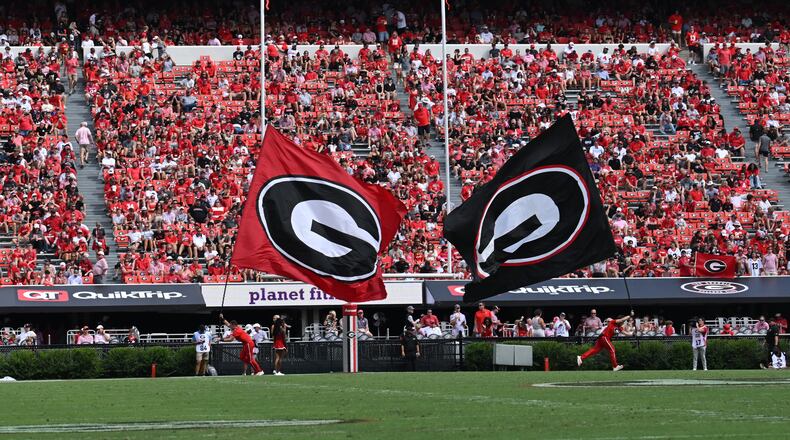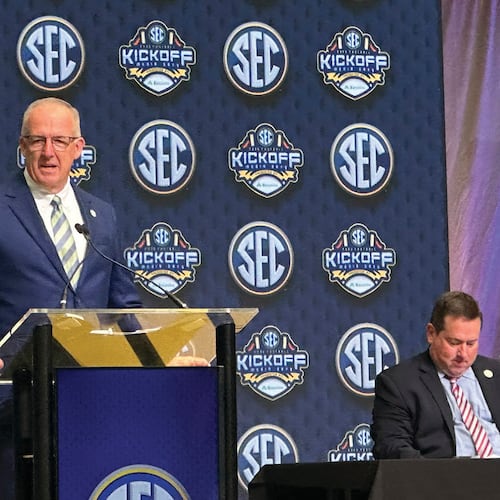Georgia football’s “First Five” got their recognition from the program in 2021. Richard Appleby, Horace King, Chuck Kinnebrew, Clarence Pope and Larry West were honored the first Black scholarship players in school history. They broke that barrier in 1971, four years after Kentucky’s Nate Northington became the first Black player to play in an SEC football game.
Less known is the story of Atlanta native James “Jim” Hurley, the first Black football player to play on a fall team for the Bulldogs. Hurley, a walk-on for the Bulldogs freshman team in 1967, is to be honored Sunday with the Uncommon Valor Award by the Athens branch of the Association for the Study of African American Life and History.
“I see the award as recognition of all the help I got, all the help I had,” Hurley said.
That’s the theme Hurley kept coming back to in a wide-ranging discussion about his time at UGA. Unlike the “First Five,” Hurley blazed his football trail alone. Hurley also didn’t have an athletic scholarship because Georgia didn’t award them to Black students at the time.
But Hurley said a big reason why he had a “great experience” at UGA was because he never felt alone.
“When I got there, I was covered,” he said.
There was Ken Dious, a Black football player who’d practiced with the Bulldogs in the spring of 1966 before leaving the team soon after. Dious was still a student at UGA when Hurley arrived on campus.
“He broke the ice,” Hurley said. “Unofficially, he was the first Black man to put on an SEC uniform. He told me about some of his experiences.”
Hurley also had Harry “Squab” Jones to lean on for support. Jones called himself the football team’s water boy. But he was so much more than that, Hurley said, including an advisor to football coach Vince Dooley as racial integration in college sports became inevitable.
“(Jones) was a Black man who knew my father, but we never talked to each other like knew each other like that,” Hurley said, laughing at the memory. “He would tell me what coaches said about me and that he was supporting me.”
Hurley decided to play football at UGA during a time when Black people in the South were terrorized by racist violence. Fred Smith, a historian for Athens-ASALH, said Dious received death threats from the Ku Klux Klan when he attempted to join UGA’s football team. In 1964, members of the Klan murdered U.S. Army Reserve officer Lemuel Penn after he drove through the Athens area on his way to Washington, D.C.
Hurley said he wasn’t worried about his safety “in terms of the campus environment” because UGA had started to racially integrate in 1961. He said his father and brother had misgivings about him going to Athens. Both played football at Morris Brown College. Hurley, a graduate of Atlanta’s old Harper High, considered Morris Brown before going to UGA following a year at Phillips Academy in Andover, Massachusetts.
Said Hurley: “My father and brother said, ‘We need to talk to you. We don’t want you to go.’ I thought they didn’t want me to get hurt. But they said, ‘They don’t respect you.’ I said, ‘Don’t worry about that. No one asked me to come, but I’m going to see what I can stand up to.’”
Hurley said he felt welcomed by his coaches and teammates. He became a starting defensive lineman for the freshman team. Hurley received the Bill Munday Award for achieving the highest grade-point average on the team.
But Dooley decided to redshirt Hurley for the 1968 season. After a couple of months, Hurley decided to join UGA’s track team. Eventually, Hurley transferred to Vanderbilt. In 1969, Hurley and Taylor Stokes became the first Black football players for the Commodores. Hurley still lives in Nashville.
Hurley said he left UGA because he saw other SEC schools offering scholarships to Black players while Dooley dragged his feet.
“I don’t know what kind of future they have for Black athletes,” Hurley said he thought at the time. “I better go somewhere else.”
Hurley made his decision after seeing a schedule of future games for Georgia that included Vanderbilt. He wanted to come back to Athens and play the Bulldogs. The Commodores did so in 1970, but Hurley was recovering from injuries and didn’t play until the near the end of Georgia’s 37-3 victory.
Hurley fondly recalled the PA announcer saying, “Hurley on the tackle” and the postgame scene.
“Both Vince Dooley and (defensive coordinator) Erk Russell came back out of the dressing room and shook my hand,” Hurley said.
A week later, Dooley wrote a letter to Hurley. The coach had seen reports on comments that Hurley made in a special report titled “Crumbling Segregation in the Southeastern Conference.” Hurley said he “saw a lot of good things (at Georgia) but a lot of things that needed to be improved.”
In the letter, Dooley wrote that he hated to see Hurley go and that “all of us here (at Georgia) have a tremendous amount of respect for you, and everything that you have said and done has been a credit to you and your race.” Dooley wrote that there was “no doubt in my mind” that Hurley would have eventually been awarded a scholarship if he’d stayed in Athens.
The next year, Dooley signed the “First Five.” Dooley died in 2022.
“Dooley did an amazing thing,” Hurley said. “He set a standard in terms of doing something nobody was doing. Most coaches were taking one or two, maybe three, Black players. He got five. That was real pleasing.”
Athens-ASHLA will honor Hurley for his role in paving the way for those pioneers. The Uncommon Valor Award presentation is scheduled for ASALH’s Founder’s Day celebration at 3 p.m. Sunday at First AME Church in Athens. For more information, contact athensasalh@gmail.com.
About the Author
Keep Reading
The Latest
Featured




